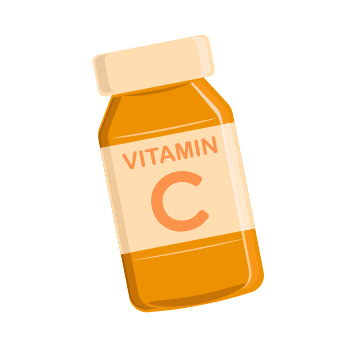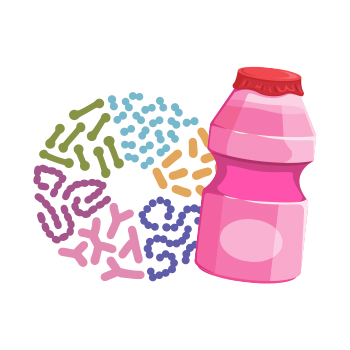


Sign-up for {N}power to get exclusive discounts, newsletters, members-only features, and more!

Do you always seem to get hit hard with whatever bug is going around? Or maybe you’re the lucky one who never gets sick, even when everyone around you is. Or, when you do get sick, you’re able to recover quickly. This is immune competence, the ability (or inability) to avoid illness and bounce back quickly when you do get sick. Having good immune competence means your immune system responds quickly and efficiently to any kind of attack, rather than over- or under-reacting. And researchers are learning that people who have good immune competence tend to stay healthier overall and live longer.1 Even better: Immune competence is something you can naturally improve.

First, consider this: Regular consumption of ultra-processed foods leads to immune dysfunction via an increase in oxidative stress, inflammation, and intestinal dysbiosis (70-80% of immune cells are located in the gut).2 3 No surprise there, right? Like every other cell in your body, the immune system’s cells, from lymphocytes to natural killer cells, depend on good nutrition for optimal functioning, and processed foods are not it. Avoiding processed foods loaded with added sugar, inflammatory oils, refined carbohydrates, artificial colors, flavors, and preservatives and devoid of any real nutrition is vital to support immune competence. Instead, look to a whole-foods diet of organic fruit and vegetables, regeneratively raised and organic meat, pasture-based dairy, and organic whole grains, nuts, seeds, and legumes. These foods are rich in antioxidants, fiber, vitamins, minerals, and healthy fats that nourish your immune system, preparing it to quickly and effectively jump into action when needed.

Another way to build immune competence is to eat a variety of fermented foods to support a healthy gut, because, as mentioned, a majority of immune cells reside in our guts, and dysbiosis (an unhealthy balance of gut bacteria) is a main driver of immune dysfunction.4 5 A recent trial from Stanford School of Medicine, including 36 healthy adults, found that 10 weeks of regularly consuming fermented foods like yogurt, fermented cottage cheese, kimchi and other fermented vegetables, and kombucha increased microbial diversity in the gut, reduced inflammation, and improved immune responses, with stronger effects seen with larger servings.6 Eat your ferments!
The supplements listed below are foundational nutrients that the immune system requires to function properly; they should be taken regularly to support immune competence. This doesn’t mean that you won’t get sick, but a healthy, competent immune system is more resilient and better able to handle an infection, lessening symptoms, severity, and duration.

Vitamin C is a key player in immunity and it is required by a number of critical immune cells, including white blood cells and natural killer cells, to function properly. It has an impact on both innate and acquired immune responses against infection. Because the human body cannot make vitamin C and this important antioxidant is severely depleted by inflammation, stress, and illness, as well as being water soluble, meaning the body does not store it, vitamin C is a great nutrient to supplement. Additionally, vitamin C is similar in structure to glucose and uses the same receptor sites to enter the cell membrane—this means that if you eat a lot of sugar and simple carbs, less vitamin C will be absorbed because glucose is “hogging” the receptors sites. The key is to maintain optimal levels.
Take: 500-1,000 mg daily for maintenance. This may be increased up to 6,000 mg daily, in divided doses, during times of infection.7 8 9 10 11 12
Vitamin D plays a central role in proper immune function and is required by our bodies to make a variety of germ-fighting factors, such as the important antimicrobial compound cathelicidin. It has also been shown to reduce the risk of viral infections, such as influenza, pneumonia related to viral infections, and acute respiratory tract infections. Researchers have noted that the winter and early-spring increase in viral infections appears directly related to less seasonal sun exposure and low vitamin D levels, and that those with low vitamin D levels tend to have more serious complications from viral infections like the flu.
Take: 5,000 IU daily for adults, and up to 1,200 IU daily for children.13 14 15 16 17 18 19 20 21 22
Like vitamins C and D, this trace mineral is crucial for the proper functioning of the immune system and works synergistically with C and D to support both innate and adaptive immunity. These nutrients are actively used by immune cells to fight infections, including upper respiratory tract infections. Even moderate deficiencies in zinc can increase the risk of infection, and according to one review, “…impaired immune functions due to inadequate zinc status may be the most common cause of secondary immunodeficiency in humans.” Zinc influences the activity of important immune cells like macrophages, neutrophils, and natural killer cells, and is required for certain immune cells to communicate. Zinc supplementation has been shown to reduce both the risk and duration of pneumonia in children and the elderly, as well as reducing the incidence of infections like the common cold and flu.
Take: 30 mg daily for long-term support. Increase to 50-75 mg daily during times of infection.23 24 25
Selenium is another trace mineral that is important in maintaining healthy immunity. In people who are not severely selenium deficient, selenium supplementation has been shown to stimulate the immune response, including enhancing immune cell response to antigens. Other research indicates that selenium plays a role in regulating the expression of cytokines, cell-signaling molecules that play a crucial role in immune response. Selenium deficiency has been shown to impair the immune response, allowing viruses to freely replicate, and to increase a person’s susceptibility to viral infections.
Take: 100-200 mcg daily.26 27 28
Take a B-complex daily to support general health and overall immune function. B6, B1, and B12 are especially important for immune health. Low B6 intake has been associated with impaired immune function, including decreased production of lymphocytes (white blood cells and T-cells) and interleukin-2, which is crucial in the body’s response to infection. B1 (thiamin) supports healthy levels of inflammation, particularly during the early stages of the immune response, known as innate immunity. This helps maintain a balanced immune response, a key feature of immune resilience. B12 is also important to immune function because it is necessary for proper cell division and growth, including that of white blood cells.
Take: A quality B-complex supplement will cover the bases, but for extra immune support, you may consider adding B6, B1, and B12 in addition to the B complex.29

As already mentioned, a large portion of immune cells are located in our GI tracts, with growing research indicating that a healthy gut microbiome plays a vital role in defending the body against pathogens, while dysbiosis can increase the risk of getting an infection. In addition to regularly eating fermented foods, consider adding a daily probiotic supplement to optimize gut health.
Take: What the label suggests. Strains including Bifidobacterium bifidum, Lactobacillus rhamnosus GG, B. lactis, and L. brevis provide preventive benefits when taken long term.30 31 32 33 34 35 36
We know that spending time in nature is good for us. In fact, research has found that regular exposure to greenspaces—whether a forest, a city park, or your garden—reduces the risk of type-2 diabetes, cardiovascular disease, and high blood pressure, as well as supports good mental health and better overall health.37 And some researchers say that it’s nature’s ability to enhance immune function that is central to all of those other health benefits.
Researchers know that exposure to nature puts the body into “rest and digest” mode and out of “fight or flight” mode; when our bodies are in “rest and digest” it allows the body to build strong immunity.38 39 An even more intriguing way that nature exposure enhances immunity was discovered via the Japanese art of forest bathing, or shinrin yoku, which is simply just being in nature—not hiking, not exercising—but just sitting quietly and taking in the green surrounding you, whether in a forest or your yard. By studying the effects of forest bathing, researchers have discovered that phytoncides, airborne chemicals released by trees and plants that protect them from disease, have antibacterial and antifungal properties that boost our own immune systems when we inhale them. One way in which they do this is by increasing the number of natural killer cells, specialized cells involved in innate immunity, and decreasing inflammation.40 One recent study found that the increased activity of natural killer cells from a three-day, two-night forest bathing trip lasted for more than 30 days.41 So the next time you go camping, or even just spend time sitting outside, taking in the trees, think of it as a long-lasting boost to your immune system!



Sign-up for {N}power to get exclusive discounts, newsletters, members-only features, and more!